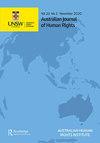残疾评估和算法面纱:国家残疾保险计划被放弃的“独立评估”提案的教训
Q1 Arts and Humanities
引用次数: 0
摘要
摘要残疾评估或社会保障资格的标准化方法并不新鲜。然而,新算法评估方法的实验开始出现。本文研究了澳大利亚国家残疾保险计划(NDIS)下提出的一种算法评估,称为“独立评估”,该计划旨在缩小和标准化该计划的资格标准。在公众持续强烈反对后,该提案最终被放弃。然而,残疾评估将继续面临变化和争议,从而及时考虑被放弃的提案,包括通过基于权利的视角。“独立评估”提案似乎在几个方面违反了《残疾人权利公约》,包括过于标准化和以损害为重点,这与强烈影响《残疾人权利委员会》的残疾社会模式背道而驰。评估提案缺乏一个明确的审查机制来对结果提出上诉,并且依赖于一小部分外包专业人员来进行评估,而排除了个人自己的支持专家的意见。对社会文化差异的忽视也引起了关注,特别是对土著残疾人的关注。本文最后询问了基于权利的残疾评估是什么样子的,同时批判性地审视了狭隘关注残疾评估方法的局限性。本文章由计算机程序翻译,如有差异,请以英文原文为准。
Disability assessments and the algorithmic veil: lessons from the abandoned ‘independent assessments’ proposal for the National Disability Insurance Scheme
ABSTRACT Standardised approaches to disability assessment or social security eligibility are not new. However, experiments in novel algorithmic approaches to assessment are beginning to appear. This article examines a proposed algorithmic assessment—dubbed ‘independent assessments’—under Australia’s National Disability Insurance Scheme (‘NDIS’), which sought to narrow and standardise eligibility criteria for the Scheme. The proposal was ultimately abandoned following sustained public backlash. Yet, disability assessment will continue to face change and contestation, making it timely to consider the abandoned proposal, including through a rights-based lens. The ‘independent assessment’ proposal appeared to violate the Convention on the Rights of Persons with Disabilities (‘CRPD’) on several fronts, including being overly standardised and impairment focused in ways that were contrary to the social model of disability that strongly influenced the CRPD. The assessment proposal lacked a clear review mechanism to appeal outcomes and relied on a narrow pool of outsourced professionals to undertake the assessment to the exclusion of input by the person’s own support specialists. Inattention to socio-cultural difference also raised concerns, particularly regarding Indigenous people with disabilities. This article concludes by asking what a rights-based disability assessment looks like, while critically examining the limits of a narrow focus on disability assessment methodology.
求助全文
通过发布文献求助,成功后即可免费获取论文全文。
去求助
来源期刊

Australian Journal of Human Rights
Arts and Humanities-History
CiteScore
1.30
自引率
0.00%
发文量
43
期刊介绍:
The Australian Journal of Human Rights (AJHR) is Australia’s first peer reviewed journal devoted exclusively to human rights development in Australia, the Asia-Pacific region and internationally. The journal aims to raise awareness of human rights issues in Australia and the Asia-Pacific region by providing a forum for scholarship and discussion. The AJHR examines legal aspects of human rights, along with associated philosophical, historical, economic and political considerations, across a range of issues, including aboriginal ownership of land, racial discrimination and vilification, human rights in the criminal justice system, children’s rights, homelessness, immigration, asylum and detention, corporate accountability, disability standards and free speech.
 求助内容:
求助内容: 应助结果提醒方式:
应助结果提醒方式:


